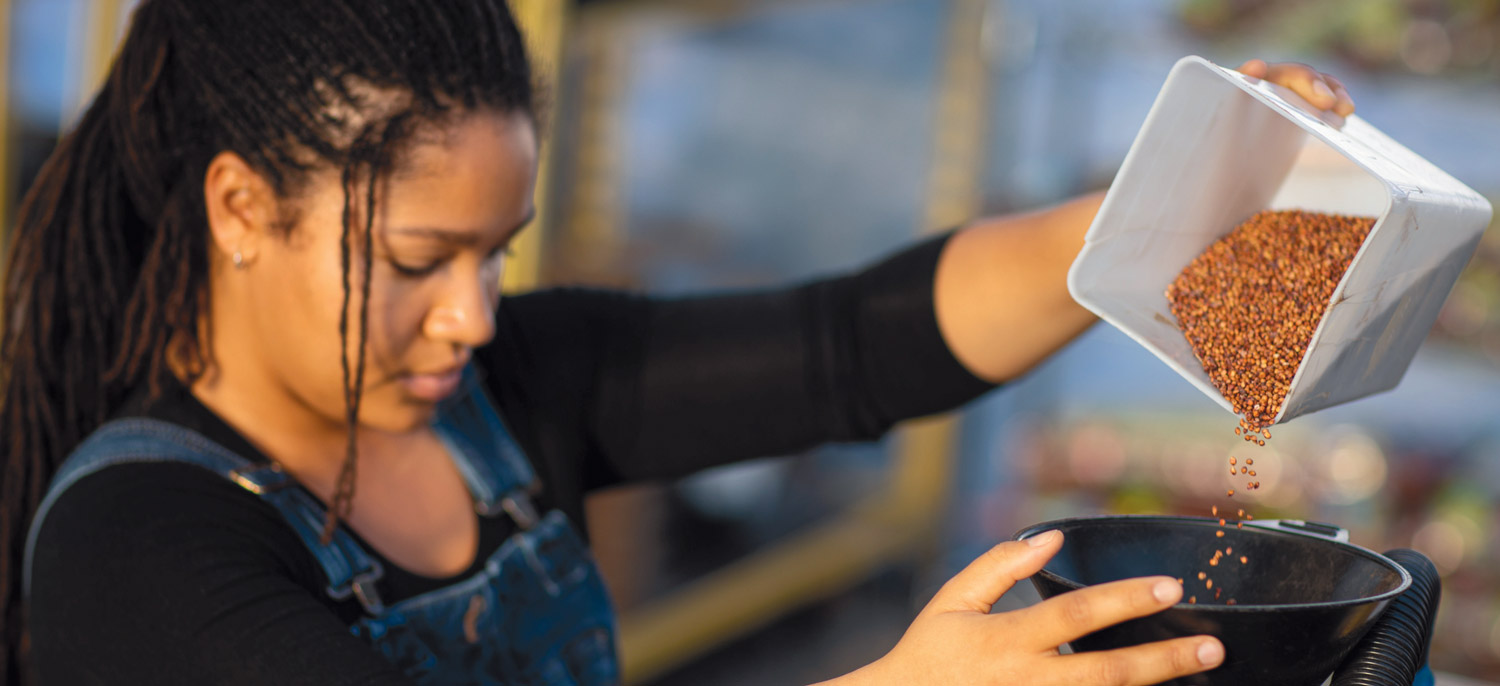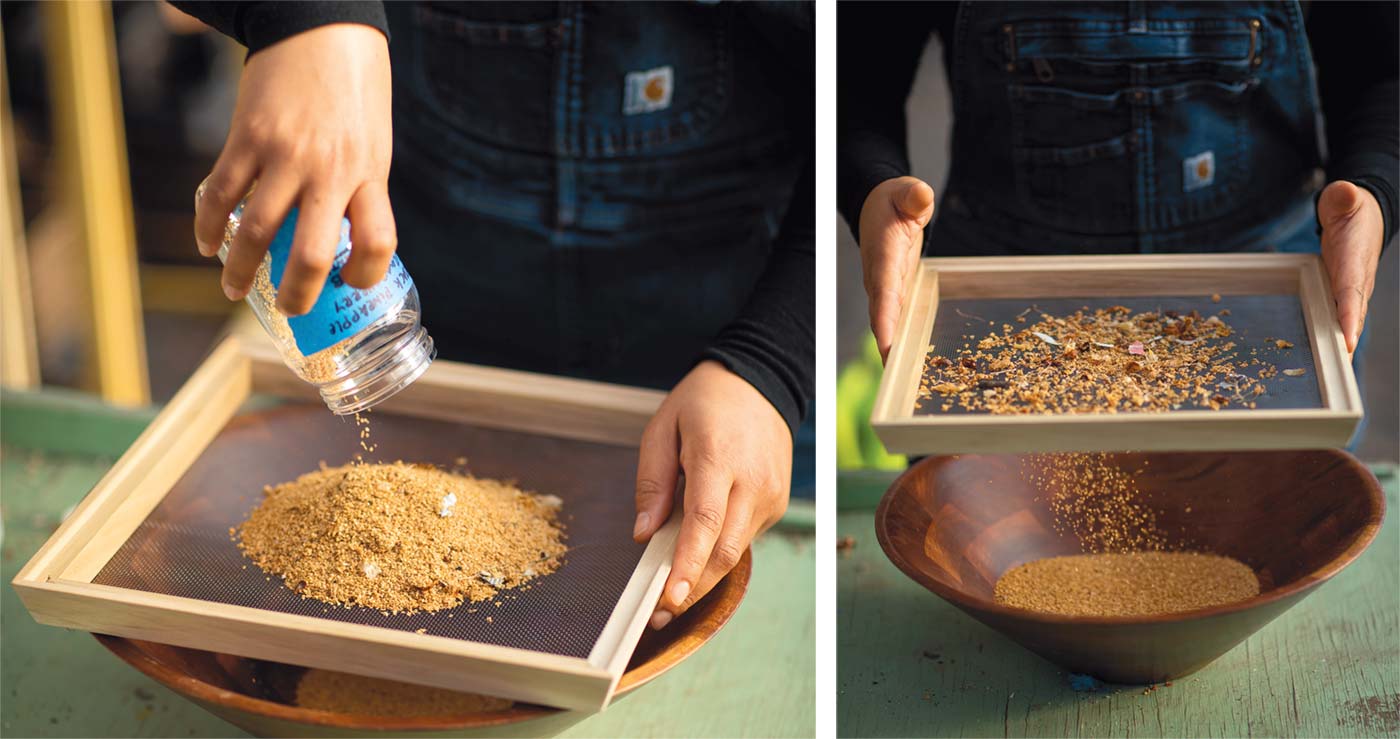Amirah Mitchell is Farming for Community and Change

Amirah Mitchell, owner of Sistah Seeds
IN THE DEAD OF WINTER, Amirah Mitchell planted tomatoes, peppers and eggplants on heat mats in her greenhouse. Not too long later come the mustard greens and garden peas. But the seeds she plants are the smallest aspects of the movement she is growing. For Mitchell, planting these tiny seeds are acts of resistance. From each plant, the next generation of seeds saved and shared. Each seed connects people to their land, their food, their culture, their nourishment and their independence.
Mitchell’s growing and distributing culturally-important heirlooms from the African diaspora in her business, Sistah Seeds. She’s starting with seeds because they’re essential to existence. “They’re the basis of our food system, the basis of our culture, the basis of the means by which our communities are able to become self-sufficient and self-sustaining,” she says. “Reconnecting the farmer and the seed is a really important way for our communities to become whole again.”
Mitchell, 29, has worked with plants for more than half of her life. She began as a teenager in Boston with a summer job that fit her love of being outdoors. Something clicked, and her interest in farming intensified over the next four growing seasons with the same youth program. Mitchell nurtured her connection to the land at urban farms in Boston and later Atlanta, but the nonprofits where she worked were not diverse. That’s what led her to Philadelphia.
“I was looking to leave Boston and to be in a place where I could farm among my community,” she says. “And so I came to Philadelphia because it does have such a rich community of Black and Brown farmers in the city and Black and Brown-led farming organizations.”
By the time she moved here in 2018, she had set her farming focus on seeds. “I saw a need for Black and Brown farmers to be served in that way,” she says. “There just simply are not a lot of seed companies run by people of color.”
In Philadelphia, Mitchell has grown, harvested and processed seeds at True Love Seeds, a farm offering culturally important and open-pollinated vegetable, herb, and flower seeds. She’s studying horticulture at Temple University. She developed a curriculum at Greens-grow Farms as its 2021 seed keeping resident. She’s also led workshops for Soul Fire Farm and Southern Exposure Seed Exchange.
From this work grew Sistah Seeds, a seed farm she created as a way to connect with her African heritage while also nourishing her family and others like herself. Through Sistah Seeds, Mitchell will grow the seeds and share the knowledge.
“I came to Philadelphia because it does have such a rich community of Black and Brown farmers in the city and Black and Brown-led farming organizations.”

“It has been incredible to see how many people are really interested and invested in this little seed farm of mine.”
• • • •
Big ideas aside, farming for seeds has a long gap for the payoff, especially for a startup. In a vegetable farm, for example, money comes in as harvests are sold throughout the season. With seeds, the money usually doesn’t arrive until much later, at the end of the season. So, Mitchell turned to crowdfunding in the fall of 2021 to come up with startup funds for her first growing season. In less than three months, she reached her GoFundMe goal of $32,000 (and is still accepting donations).
Joining a crowdfunding platform pushed Mitchell back into social media, which she left more than a decade ago. It’s been uncomfortable, but she’s amazed by the connections she’s made. “I’ve been floored by the amount of enthusiasm and generosity just in the people in my network and my surrounding area,” she says. To date, nearly 500 people have donated to Sistah Seeds. Some shared words of encouragement with their donations, including:
Seeds are essential to life and the diaspora. Variety is the only way forward. Food is justice.
“It has been incredible to see how many people are really interested and invested in this little seed farm of mine,” Amirah says.
For Sistah Seeds’ first year, Mitchell joined the Seed Farm incubator program in Emmaus. The incubator is a program of Community Action Lehigh Valley and Second Harvest Food Bank of the Lehigh Valley and Northeast Pennsylvania, which is dedicated to growing food and new farmers. There, she’ll lease an acre of land and has access to equipment. Mitchell is also realizing a long-time dream of being able to walk to her farm.
The new year started with crop planning. Mitchell’s concentrating on West African, African-American and Afro-Caribbean vegetable seeds, and the possibilities are vast. To start, she’s focusing on seeds important to her and seeds that tell the story of the diaspora. “That can be hard to find, but there are researchers out there, historians out there who are connecting stories to these cultural crops,” she says.
On her must-grow list are the green-striped cushaw squash, one of the first crops she grew from seed. The “sweet potato pumpkin” becomes pie filling, pumpkin butter, pudding or a delicious roasted vegetable.
Culinary historian and author Michael W. Twitty traces the cushaw squash’s heritage from the indigenous peoples of Central America and the West Indies to the farms and tables of Thomas Jefferson and George Washington, the seeds carried by enslaved Africans and their descendants to southern Appalachia and beyond. “It’s a squash that my great-grandfather used to grow,” Mitchell says.
Also on the year-one list: as many black-eyed pea varieties as she can fit. They’re a favorite and so easy to grow.
“I just love how when they’re ready to be harvested, they kind of extend their pods forward, almost like they are asking you to take them,” she says. “I really delight in harvesting those.”
Rounding out the farm will be several varieties of African rice and multiple varieties of okra.
There will be room for the peppers Horace Pippin grew in West Chester. Pippen was a self-taught painter whose work brought national attention for its expressive and bold nature. His horticultural and culinary influence lives on with his peppers. Fish peppers, for example, were a staple in oyster and crab houses around Chesapeake Bay but almost became extinct. Pippen saved pepper seeds and shared them. They’re known for their heat, as well as their history.
And, of course, there will be plenty of space for collard greens.
Thanks to Mitchell and other evangelists, interest in seeds and seed saving is growing. In January, Seed Savers Exchange offered a webinar series about one effort in the Midwest to welcome seeds home to Indigenous communities. There was such an overwhelming response, the free sessions quickly sold out.
Growing for seeds is not quick work. For some crops, seed can be harvested when vegetables are ready for market. Others take more time and patience. “You’re really working with the plant throughout its entire life cycle,” Mitchell says. “I really appreciate there’s this element of being a midwife to the plant and seeing it through from seed to seed, allowing it to give birth to the next generation.” As the plants grow, some seed will supply larger seed companies. Others will be sold retail by Sistah Seeds.
Mitchell expects that the first seeds will reach wholesale customers by the end of the year. For her own retail sales, she plans to share seeds by January. She’ll share updates on SistahSeeds.com and on Instagram at SistahSeeds. Though the farm is new, Mitchell envisions Sistah Seeds growing with its customers by providing the seeds to Black farmers who want to grow for their communities.
There are no fixed rules on what makes a seed culturally important. That could mean a plant with a pedigree traceable through generations or a plant grown for a few years. The story may be different, but for each seed, somebody at some point chose to save it. Maybe it was perfect for a family recipe. Maybe it was a good grower.
As Sistah Seeds expands, Mitchell has her eyes on a permanent home somewhere in the Southeast, perhaps in five years. “The South feels like a home, not just for my family roots,” she says, “but also for many of the seeds that I will be stewarding. I think they will feel at home in the South. And that’s where I want them to be.”
Mitchell is growing seeds and seed savers through education. Last year, she worked with Greensgrow, developing curriculum in its seed keeping fellowship program.
She’s considering hosting virtual seed saving classes this year, along with farm tours and work days to share the knowledge of seed saving. The classes will teach farmers and gardeners who are not beginners so they can take a deeper dive into seed work. And though Mitchell is in charge, she’ll have help from her partner, Kofi Sankofa, and she welcomes volunteers, especially in the spring.
Mitchell talks about seeds as empowerment. They’re radical at their very essence, in the language of ideas and in the botanical origins of the word. The radicle is the first thing to emerge from a seed. It grows down. It sets roots. It’s the anchor allowing the seedling to emerge.
At the root of Mitchell’s work, seeds are food. Seeds are life.
- Learn more at sistahseeds.com.
WHAT’S NEXT
Here are some of the crops Sistah Seeds will grow in 2022.
GREEN GLAZE COLLARD
Introduced in 1820, this collard has smooth, bright green leaves and is heat- and frost-resistant.
PEPPERPOT PEPPER
This red-orange, twisted chiltepe pepper was the base for the one-time Philadelphia staple, pepperpot soup.
SCOTCH BONNET
This pepper from the Caribbean is hot yet fruity and full-bodied, with a name that comes from the “tam o shanter” Scottish hat.
FISH PEPPER
This hot pepper dates back to the 1800s, with green fruit that matures to orange and red. The fruit and leaves develop white stripes that fade.
ODELL’S WHITE WATERMELON
Traced back to 1880, these large melons store well and have a rich, sweet flavor and a tender white rind that’s just right for pickling.
SIEVA CAROLINA BUTTERBEAN
Grown at Monticello before 1750, this plant produces white beans on tall vines (up to 10 feet).
“FISH EYE” BLACK-EYED PEAS
With roots in Mali, West Africa, these seeds produce cream-colored peas with black eyes on 6-foot-tall vines.
- Amirah Mitchell’s also seeking seeds, specifically those saved from Black-identifying people. Contact her via Instagram at @SistahSeed



